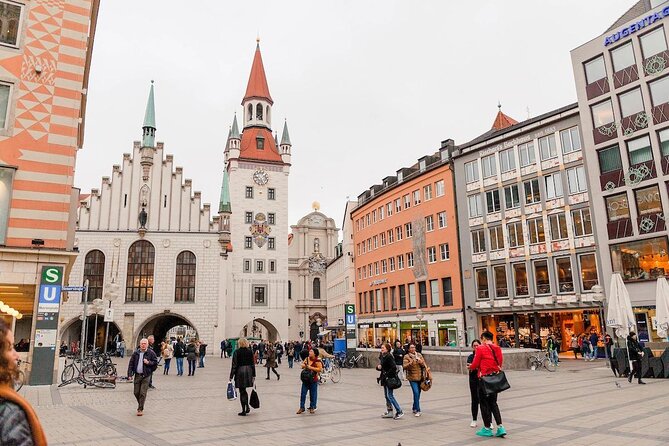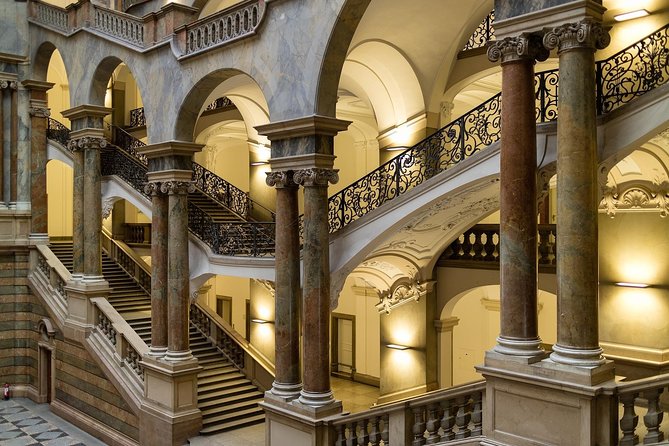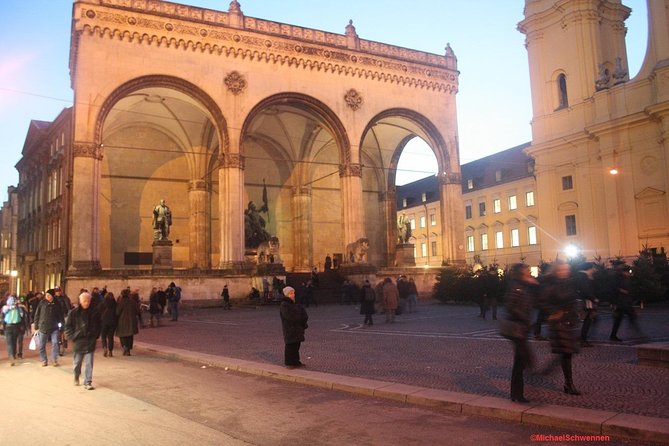Munich During the Nazi Regime – Ideology and Resistance
Amidst the cobblestone streets of Munich, one can uncover a story that intertwines both unwavering adherence to Nazi ideology and the subtle whispers of resistance.
Imagine a clandestine meeting in a dimly lit tavern, where whispers of dissent float through the air, challenging the oppressive regime. As the shadows of history loom large over the city, one question lingers – what drove individuals to defy a power that seemed insurmountable?
The intricate web of beliefs and actions woven into Munich’s fabric during the Nazi era beckons exploration, promising a journey that transcends mere historical accounts and delves into the depths of human courage and conviction.
Key Points

- Munich was a hub for disseminating Nazi ideology through propaganda and controlled media.
- Resistance movements like the White Rose Society and Edelweiss Pirates emerged to defy the oppressive regime.
- Munich’s society experienced significant social shifts and cultural transformations under Nazi rule.
- The city’s historical sites and cultural richness were intertwined with Nazi influence, reflecting a complex historical narrative.
Historical Background of Munich

As Munich stood as a cultural hub long before the rise of the Nazi regime, its historical background is rich with a tapestry of art, architecture, and intellectual pursuits. The city’s cultural heritage is deeply rooted in its vibrant arts scene, renowned museums, and historic landmarks.
Urban development in Munich has been marked by a blend of traditional Bavarian architecture and modern infrastructure, creating a unique cityscape that reflects its rich history. From the elegant architecture of the Residenz to the sprawling English Garden, Munich’s urban development showcases a harmonious coexistence of old-world charm and contemporary innovation.
This juxtaposition of the past and the present is a testament to Munich’s ability to evolve while preserving its cultural identity.
Nazi Ideology and Propaganda
Munich’s historical background of vibrant arts and cultural tapestry paved the way for the insidious spread of Nazi ideology and propaganda during the regime’s rule. The Nazis used a variety of indoctrination techniques to manipulate public opinion and further their agenda:
- Hitler Youth: Targeted the young population for ideological indoctrination.
- Controlled Media: Utilized propaganda to control information and shape perceptions.
- Rallies and Events: Organized grand events to showcase power and garner support.
Through these Nazi indoctrination techniques and propaganda strategies, Munich became a hub for the dissemination of fascist beliefs, influencing the city’s residents and contributing to the regime’s hold on power.
Resistance Movements in Munich

During the Nazi regime, courageous individuals in Munich formed underground networks to resist the oppressive rule and challenge the authority of the regime. These resistance movements played a crucial role in defying the Nazi regime and preserving the values of freedom and humanity. The defiance stories of these brave individuals inspire generations to stand up against tyranny and injustice.
| Resistance Group | Activities | Impact |
|---|---|---|
| White Rose Society | Distributed anti-Nazi leaflets and pamphlets | Raised awareness and inspired others |
| Edelweiss Pirates | Engaged in acts of sabotage and graffiti | Undermined Nazi authority |
| Kreisau Circle | Intellectually resisted Nazi ideologies | Provided intellectual opposition |
Impact of Nazi Rule on Society
Amidst the tumultuous reign of the Nazi regime, society in Munich bore witness to profound and lasting transformations. The impact of Nazi rule on society manifested in various ways, leaving a mark that echoed through the years.
Some key points to consider include:
-
Societal Repercussions: The fabric of Munich’s society was deeply altered by the Nazi ideology, leading to significant shifts in social structures and norms.
-
Cultural Legacy: The cultural landscape of Munich underwent a metamorphosis under Nazi rule, with art, literature, and music reflecting the regime’s influence.
-
Resistance and Resilience: Despite the oppressive regime, acts of resistance and pockets of resilience emerged, showcasing the indomitable spirit of certain individuals within Munich society.
Key Historical Sites in Munich
Key historical sites in Munich beckon visitors to unravel layers of the city’s past, unveiling stories of significance and resilience.
Architecture exploration enthusiasts will marvel at the stunning Gothic architecture of the Frauenkirche, a symbol of Munich’s rich history.
Local perspectives add depth to visits to the Hofbräuhaus, the world-famous beer hall that has been a meeting point for locals and visitors alike for centuries.
The Englischer Garten, a vast urban park larger than New York’s Central Park, offers a peaceful retreat and a glimpse into Munich’s commitment to green spaces.
The Residenz, once the royal palace of the Wittelsbach monarchs, showcases opulent interiors and extensive art collections, providing a window into the city’s royal heritage.
Role of Munich in Nazi Germany
Munich played a significant role in the history of Nazi Germany, serving as a pivotal hub for the dissemination of Nazi ideology and the implementation of key policies. This city’s significance during the Nazi era can’t be understated.
Some key points to consider are:
- Munich was where the Nazi Party was founded, and it remained a central location for party activities throughout the regime.
- The city housed prominent Nazi buildings and monuments, reflecting the extent of Nazi influence in Munich.
- Munich’s role as a cultural and intellectual center made it a breeding ground for the dissemination of Nazi propaganda and the indoctrination of the population.
The intertwining of Munich’s history with Nazi influence shaped the city profoundly during this dark period.
Memorializing the Victims
In recognizing the profound impact of Munich’s history intertwined with Nazi influence, the focus now shifts towards commemorating and honoring the victims of this dark chapter through meaningful memorials and remembrance initiatives.
Commemorative events play a crucial role in acknowledging the suffering and loss experienced during the Nazi regime. By organizing ceremonies, exhibitions, and tributes, the community ensures that the memories of those affected are preserved and respected.
Educational initiatives also play a vital role in ensuring that the atrocities committed are never forgotten. Through programs that educate about the history of Munich during the Nazi era, future generations can learn from the past and strive to create a more tolerant and just society.
These efforts collectively contribute to honoring the victims and preventing such tragedies from happening again.
Contemporary Reflections on History
Reflecting on history today reveals the interconnectedness of past actions with present societal norms and values. Modern perspectives offer a fresh lens through which to view historical events, fostering a deeper understanding of how they shape our current world.
In considering Munich during the Nazi regime, it becomes evident that examining the past through contemporary reflections allows for critical analysis and the recognition of warning signs to prevent similar atrocities. The educational significance of exploring this history lies in its ability to provoke discussions on ethics, human rights, and the importance of standing against oppression.
Through these reflections, you can draw parallels between past ideologies and present-day challenges, fostering a collective commitment to promote tolerance and equality.
Common questions
How Did the Nazi Regime Specifically Target Minority Groups in Munich During Their Rule?
When examining how the Nazi regime targeted minority groups in Munich, one can observe a harrowing history of persecution, fueled by propaganda and ruthless policies. Resistance strategies emerged amidst this oppression, intertwined with the city’s cultural landmarks.
What Were Some Lesser-Known Acts of Resistance That Took Place in Munich During the Nazi Era?
In Munich during the Nazi era, lesser-known acts of resistance included secret Resistance networks and underground activities. These courageous actions defied the oppressive regime, showcasing the bravery and determination of individuals who fought against tyranny.
Can Visitors Expect to See Any Physical Remnants or Traces of Nazi Rule Still Present in Munich Today?
Visitors exploring Munich today may encounter physical remnants of Nazi rule, such as historical landmarks and Nazi memorabilia. The urban landscape showcases Nazi architecture, serving as a poignant reminder of the city’s complex past and the impact of that era.
How Did the Local Population in Munich React to the Nazi Regime, and Were There Any Notable Instances of Defiance or Cooperation?
The local population in Munich had varied reactions to the Nazi regime, showcasing a complex mix of defiance and collaboration dynamics. Resistance movements emerged alongside instances of cooperation, highlighting the intricate socio-political landscape during that tumultuous period.
Are There Any Ongoing Efforts or Initiatives in Munich Aimed at Educating the Public About the City’s History During the Nazi Era?
In Munich, ongoing public awareness initiatives and educational programs strive to shed light on the city’s history during the Nazi era. Historical preservation and commemoration efforts play a crucial role in educating the public about this significant period.
Last Words
To sum it up, Munich’s history during the Nazi regime serves as a reminder of the power of ideology and the resilience of those who resist oppression.
By exploring the city’s past, you can gain a deeper understanding of the complexities of this tumultuous era and the enduring spirit of those who fought against it.
It’s through reflection on the lessons of history that we can strive to create a more just and compassionate world for future generations.